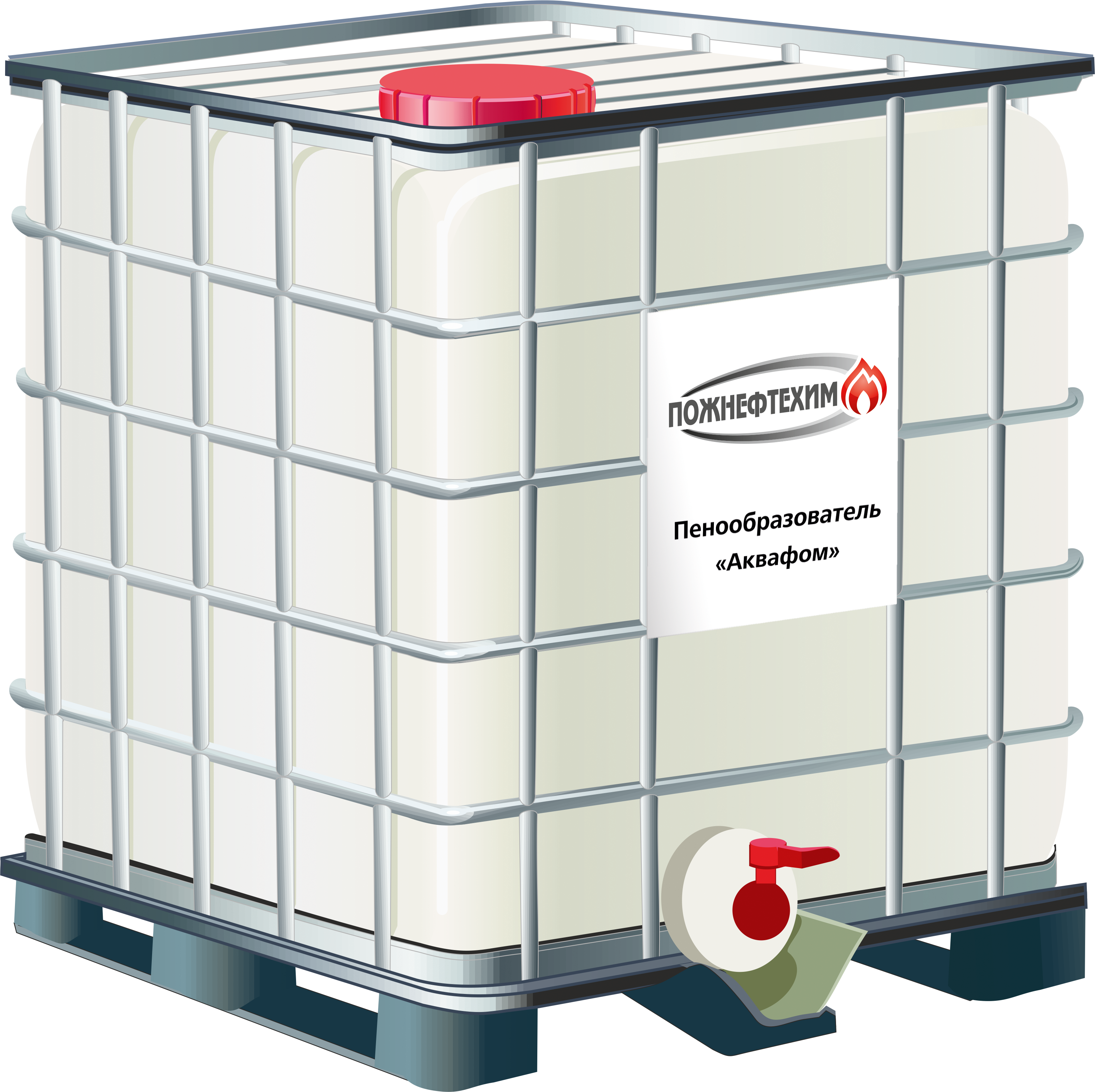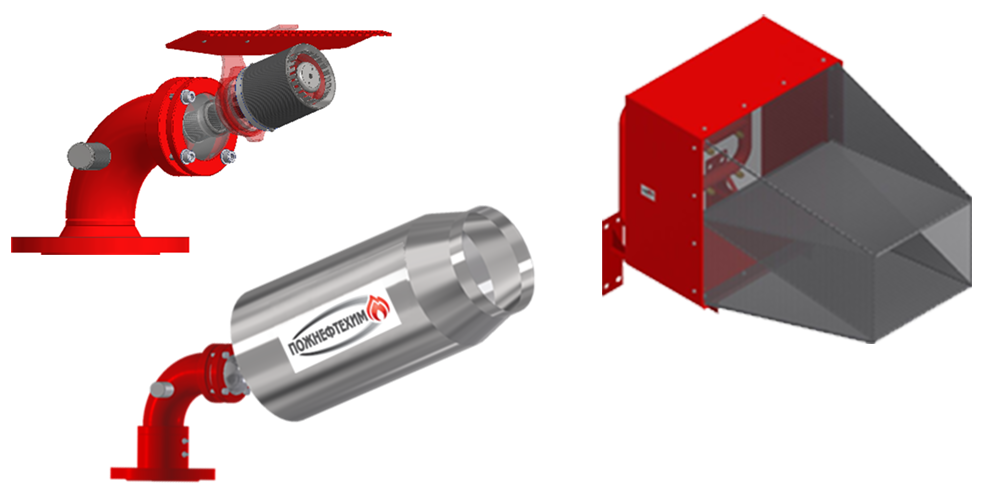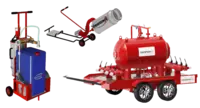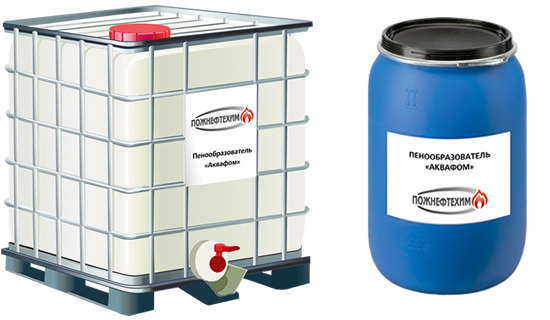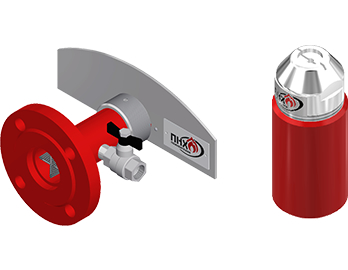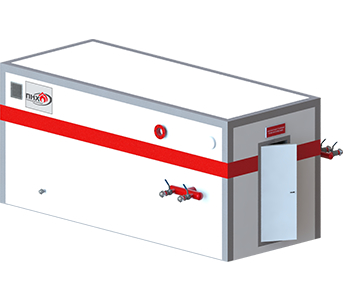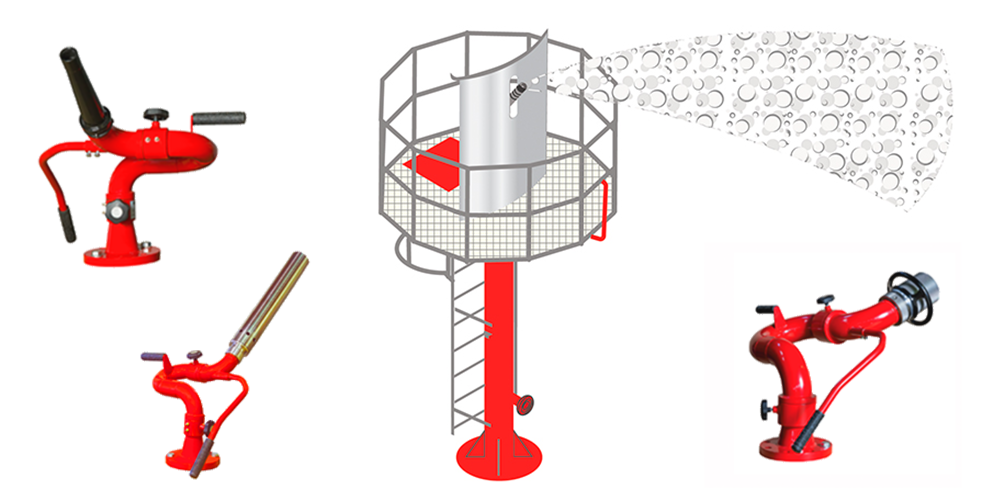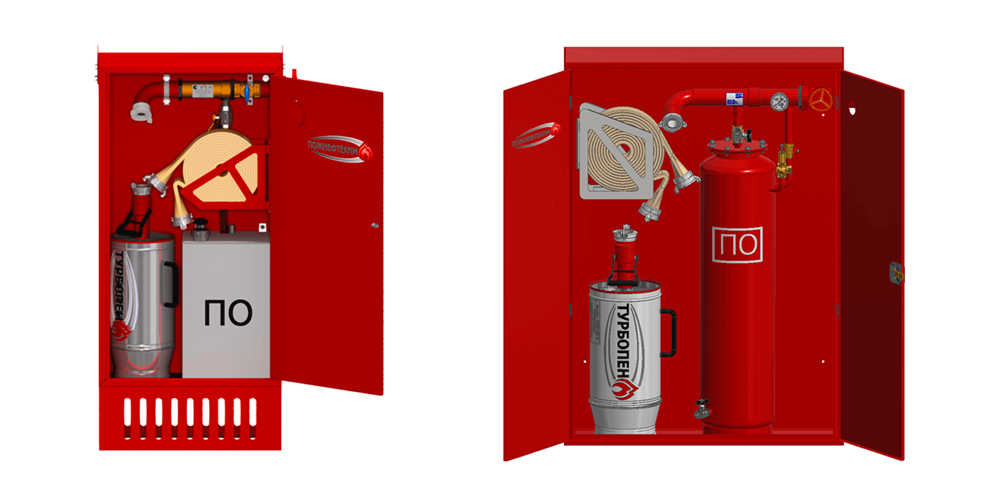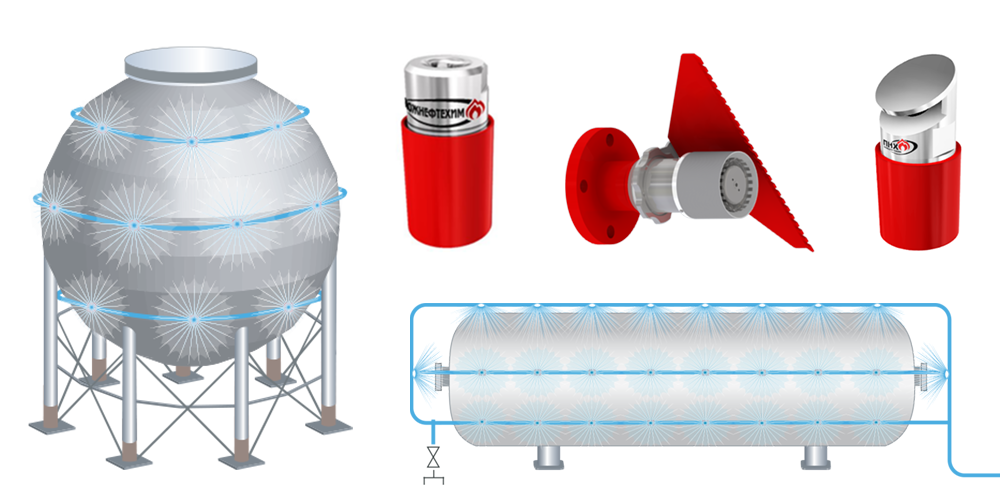AQUAFOM (S/AR) FILM FORMING FOAM CONCENTRATE
TU 2481-30-72410778-2014
General
Full name: Aquafom-S/AR synthetic alcohol-resistant foam concentrates for the intended purpose without fluorinated surfactant for extinguishing water-soluble and water-insoluble combustible liquids.
Purpose and scope
The Aquafom-S/AR universal, alcohol-resistant synthetic foam concentrate is designed to produce foam of low-, medium- and high-expansion using fresh and salt water to extinguish fires of classes A and B according to GOST 27331. It is an aqueous solution of hydrocarbon surface-active substances with stabilizing additives and is produced in the form of one modification Aquafom S/AR 6% with a pour point from max minus 3 ºС to max minus 20 ºС. To limit the mixing of the foam concentrate solution and the polar combustible liquid, plasticizers and biopolymers are added into the foam concentrate.
Aquafom-S/AR universal for fire extinguishing is specially designed to extinguish polar liquids (acetone, acetonitrile, butyl acetate, hydrazine hydrate, decyl alcohol, diethyl ether, butyraldehyde, methyl alcohol, methyl acetate, methyl tert-butyl ether, formic acid, propionic acid, propyl acetate, acetic acid, ethyl alcohol, ethyl carbitol, etc.). Aquafom-S/AR also excels in extinguishing oil products, stable gas condensates and high-octane fuels with polar additives.
Aquafom-S/AR foam concentrate is a thixotropic fluid, that is, it is able to change its kinematic viscosity under pressure created by pumping units, in the range from 4250 to 80 mm2∙s-1. According to the VNIIPO recommendations “Dosing of foam concentrates with increased viscosity by pumping units of fire engines”, the thixotropic foam concentrate, the viscosity of which decreases to 200 mm2/s and lower when tested on a rotational viscometer (rotation speed of 60 rpm), can be dosed by pumping units of firefighting engines when they are taken from extraneous capacity (or foam tank) without changing the work concentration. The viscosity of the Aquafom-S/AR foam concentrate obtained during tests on a rotational viscometer (rotation speed 60 rpm) is lower than 200 mm2/s, therefore, it can be used not only in stationary fire extinguishing installations, but also when extinguishing with mobile firefighting equipment.
The mechanism of action of the foam concentrate when extinguishing with foam of low-expansion is the isolation of the combustible substance by the resulting polymer film, the cessation of oxygen access to the fire and the temperature decrease due to cooling by the foam concentrate solution. Film insulation is achieved in less time and with less solution than with foam insulation. A specially developed composition of plasticizers and biopolymers provides greater foam stability and carbohydrate film strength. Aquafom-S/AR reliably protects flammable liquids from re-ignition. The mechanism of action when using high-expansion foam in extinguishing is similar to that of action of type S foam concentrate. When Aquafom S/AR foam concentrates are used to extinguish medium-expansion foam, an intermediate mechanism of action is implemented: the insulating layers of both foam and film are formed. A detailed description is given in the subsection “General information about foam firefighting technologies”.
Specifications
Key Quality Indicators
| Name of indicator | Value of indicator | Test method |
| Foam concentrate Aquafom-S/AR 6 % |
||
| Appearance | homogeneous liquid without sediment and separation | according to paragraph 5.2 of GOST R 50588-2012 |
| Density at 20 ºС, kg/m3 | 1000–1200 | according to GOST 18995.1 |
| Pour point, ºС, not higher than | от -3 to -20 | according to GOST 18995.5 |
| Dynamic viscosity, Pa·s, not more than | 2,5 | according to GOST 1929 |
| Hydrogen index (pH), in the range of | 6,5–8,5 | according to GOST 22567.5 |
| Foam expansion from the premix using fresh and salt water: | according to paragraph 5.3 of GOST R 50588-2012 | |
|
20 | |
|
60 | |
|
200 | |
| The stability of the low-expansion foam using fresh / salt water (time for the drain-out of 50% of the solution mass), s, at least | 180/160 | according to paragraph 5.3 of GOST R 50588-2012 |
| The stability of the medium-expansion foam using fresh and salt water (time for the drain-out of 50% of the solution mass), s, at least | 300 | according to paragraph 5.3 of GOST R 50588-2012 |
| The stability of the high-expansion foam using fresh and salt water (time for the drain-out of 50% of the solution mass), s, at least | 300 | according to paragraph 5.3 of GOST R 50588-2012 |
| Extinguishing time of n-heptane with low-expansion foam using fresh and salt water at a premix application rate of 0.059 ± 0.002 dm3·m-2·s-1, s, not more than | 120 | according to paragraph 5.4 of GOST R 50588-2012 |
| time of the model area after extinguishing with low-expansion foam supplied to the surface of a combustible liquid using fresh and salt water, s, no less than | 300 | according to paragraph 5.4 of GOST R 50588-2012 |
| Extinguishing time of n-heptane with medium-expansion foam using fresh and salt water at a premix supply rate of 0.032 ± 0.002 dm3 · m-2 · s-1, s, not more than | 120 | according to paragraph 5.6 of GOST R 50588-2012 |
| Burnback time of the model area after extinguishing with medium-expansion foam using fresh and salt water, s, no less than | 300 | according to paragraph 5.6 of GOST R 50588-2012 |
| Extinguishing time of n-heptane with high-expansion foam using fresh and salt water at a premix application rate of 0.059 ± 0.002 dm3·m-2·s-1, s, not more than | 120 | according to paragraph 5.7 of GOST R 50588-2012 |
| The extinguishing time of acetone with a low-expansion foam at a premix application rate of 0.110 ± 0.002 dm3·m-2·s-1, s, not more than | 180 | according to paragraph 5.1.1 of GOST R 53280.1-2010 |
| Burnback time of acetone in the model area when extinguishing with low-expansion foam supplied to the surface of a combustible liquid, s, no less than | 300 | according to paragraph 5.1.1 of GOST R 53280.1-2010 |
| The extinguishing time of acetone with medium-expansion foam at a premix supply rate of 0.080 ± 0.002 dm3·m-2·s-1, s, not more than | 120 | according to paragraph 5.1.2 of GOST R 53280.1-2010 |
| The interfacial tension of the premix of the foam concentrate prepared using fresh and salt water, mN∙m-1, not more than | 32 | according to paragraph 5.8 of GOST R 50588-2012 |
Fire extinguishing rate
The application rate of foam concentrate solution for extinguishing fires with low, medium-expansion foam is set in accordance with the recommendations of the FSBI VNIIPO EMERCOM of Russia for the use of Aquafom-S/AR foam concentrate for fire extinguishing and other regulatory documents.
When calculating fire extinguishing installations with foam of low, medium and high-expansion, the requirements of SP 5.13130.2009, sections 5, 6 and 7, annexes B and D should be taken into consideration.
Below you can find the data from the recommendations of the FSBI VNIIPO EMERCOM of Russia on the use of the foam concentrate for extinguishing fires with Aquafom-S/AR
Regulatory application rates of the premix of Aquafom-S/AR foam concentrate when extinguishing water-insoluble combustible liquids (oil, stable gas condensate, gasoline Normal-80 (AI-80) to Super-98 (AI-98), gasoline Regular-92, diesel, kerosene)
| Type of oil product | Regulatory application rate of solution of the foam concentrate, dm3/m2•s-1 | |
| with medium-expansion foam to the surface | with low-expansion foam to the surface | |
| Gasoline AI-80 - AI-98 | 0,05 | 0,08 |
| Kerosene | 0,04 | 0,06 |
| Diesel | 0,04 | 0,05 |
| Petroleum and petroleum products with a flash point of 28 °C and below | 0,05 | 0,07 |
| Oil and oil products with a flash point of more than 28 °С | 0,04 | 0,05 |
| Stabilized gas condensate | 0,10 | 0,10 |
The regulatory premix supply rates of the Aquafom-S/AR foam concentrate when extinguishing water-soluble (polar) combustible liquids (acetone, acetonitrile, butyl acetate, hydrazine hydrate, decyl alcohol, diethyl ether, oil aldehyde, methyl alcohol, methyl acetate, methyl tert-butyl, formic acid, propionic acid, propyl acetate, acetic acid, ethyl alcohol, ethyl carbitol, isopropyl alcohol)
| Type of oil product | Regulatory application rate of solution of the foam concentrate, dm3/m2•s-1 | |
| with medium-expansion foam to the surface | with low-expansion foam to the surface | |
| Acetone, acetonitrile, butyl acetate, hydrazine hydrate, decyl alcohol, diethyl ether, butyric aldehyde, methyl alcohol, methyl acetate, methyl tert-butyl ether, formic acid, propionic acid, propyl acetate, acetic acid, ethyl alcohol, ethyl carbitol, isopropyl | ||
| “soft” application method | 0,06 | 0,13 |
| “rigid” application method | 0,10 | 0,2 |
The “soft” application method consists in discharging the foam to the tank wall, wherefrom the foam flows smoothly down onto the surface of the combustible liquid and spreads along it. This method is implemented when foam is applied using a stationary mounted foam cameras on the tank upper zone.
The “rigid” application method consists in discharging a jet of foam directly onto the surface of a combustible liquid. This method is implemented when foam jets are applied with fire monitors, hand nozzles or foam generators are installed on the foam lifter.
Environmental protection
Aquafom-S/AR foam concentrate is a biodegradable product (the biodegradability is 100%).
No secondary hazardous compounds are generated during the production and use of the foam concentrate.
The discharge of the foam concentrate into industrial wastewater sewage is allowed when it is diluted with water to the maximum permissible concentration of surface-active substances (surfactants) of 50 mg/l (in terms of active substance). The aqueous foam solution can be discharged to biological treatment plants without local wastewater treatment by physical and chemical methods.
Wastewater is sent to the treatment plant for biological treatment.
Для просмотра полного описания технических характеристик отправьте заявку или войдите под своим профилем
